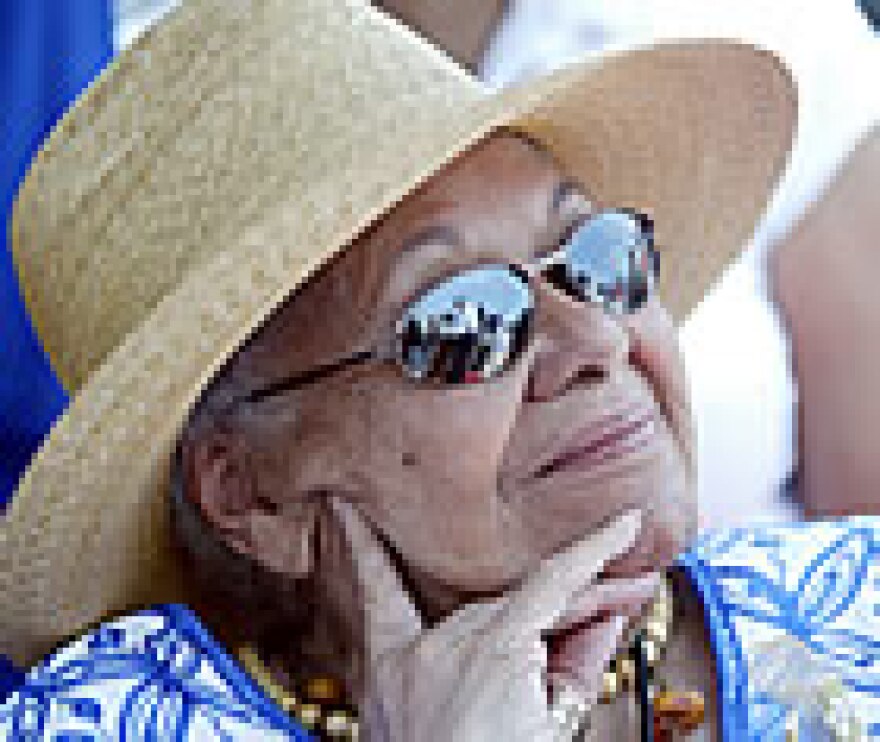By AP/KWMU
http://stream.publicbroadcasting.net/production/mp3/kwmu/local-kwmu-513011.mp3
St. Louis, MO – Katherine Dunham, a pioneer in dance, choreography, and later social activism died Sunday in New York at the age of 96.
The Illinois native brought African and Caribbean influences into the European-dominated dance world. And for the past 40 years, Dunham lived most of each year in East St. Louis, where she worked to bring arts to city with classes and workshops.
She had planned to move back for good.
Dunham established her own dance school and touring company in the 30s, which saw success even though Dunham refused to perform in segregated theatres. It was the nation's first self-supporting all-black modern dance group.
She appeared in movies including "Stormy Weather" and her stage accomplishments included her choreography of "Aida" for the Metropolitan Opera.
Charlotte Ottley, Dunham's liaison in St. Louis, last spoke with Dunham on Wednesday. She says Dunham should be most remembered for her humanitarian work in places like East St. Louis.
Dunham, who was born in the Chicago suburb of Glen Ellyn and grew up in Joliet, would have turned 97 next month.
"We weren't pushing 'Black is Beautiful,' we just showed it," she later wrote. Her dance company toured internationally from the 1940s to the '60s, visiting 57 nations on six continents.
For her endeavors, Dunham received 10 honorary doctorates, the Presidential Medal of the Arts, the Albert Schweitzer Prize at the Kennedy Center Honors, and membership in the French Legion of Honor, as well as major honors from Brazil and Haiti.
"She is one of the very small handful of the most important people in the dance world of the 20th century," said Bonnie Brooks, chairman of the dance department at Columbia College in Chicago. "And that's not even mentioning her work in civil rights, anthropological research, and for humanity in general."
In East St. Louis, Dunham set up an eclectic compound of artists from around the globe, including Harry Belafonte. Among the free classes offered were dance, African hair-braiding and woodcarving, conversational Creole, Spanish, French and Swahili, as well as more traditional subjects such as aesthetics and social science.
Dunham also offered martial arts training in hopes of getting young, angry males off the street. Her purpose, she said, was to steer the city's residents "into something more constructive than genocide."
Government cuts and a lack of private funding in the 1980s forced her to scale back her programs in East St. Louis. Despite a constant battle to pay bills, Dunham continued to operate a children's dance workshop and a museum.
Plagued by arthritis and poverty in the latter part of her life, Dunham made headlines in 1992 when she went on a 47-day hunger strike to protest U.S. policy that repatriated Haitian refugees. "It's embarrassing to be an American," Dunham said at the time.
During her career, she choreographed "Aida" for the Metropolitan Opera and musicals such as "Cabin in the Sky" for Broadway. She also appeared in several films, including "Stormy Weather" and "Carnival of Rhythm."
Dunham's New York studio attracted illustrious students like Marlon Brando and James Dean who came to learn the "Dunham Technique," which Dunham herself explained as "more than just dance or bodily executions. It is about movement, forms, love, hate, death, life, all human emotions."
In her later years, she depended on grants and the kindness of celebrities, artists and former students to pay for her day-to-day expenses. Will Smith and Belafonte were among those who helped her catch up on bills, Ottley said.
"She didn't end up on the street though she was one step from it," Ottley said. "She has been on the edge and survived it all with dignity and grace."
The daughter of an African-American tailor and a French-Canadian and Native American mother who served as a school administrator in Chicago, Dunham was born June 22, 1909.
As an anthropology student at the University of Chicago in 1935, she took her first trip to Haiti on a fellowship to study Caribbean culture and dance. The experience convinced Dunham, who was paying for college by giving dance lessons, to go into dance full-time.
"The best career advice given to the young is: 'Find out what you like doing best and get someone to pay you for doing it,"' she said later.
Dunham was married to theater designer John Thomas Pratt for 49 years before his death in 1986. She is survived by a daughter, Marie-Christine Dunham-Pratt, who lives in Rome.
Sound: Interview of Dance St. Louis Executive Director Sally Bliss about Dunham. Interview conducted by KWMUs Tom Weber.

